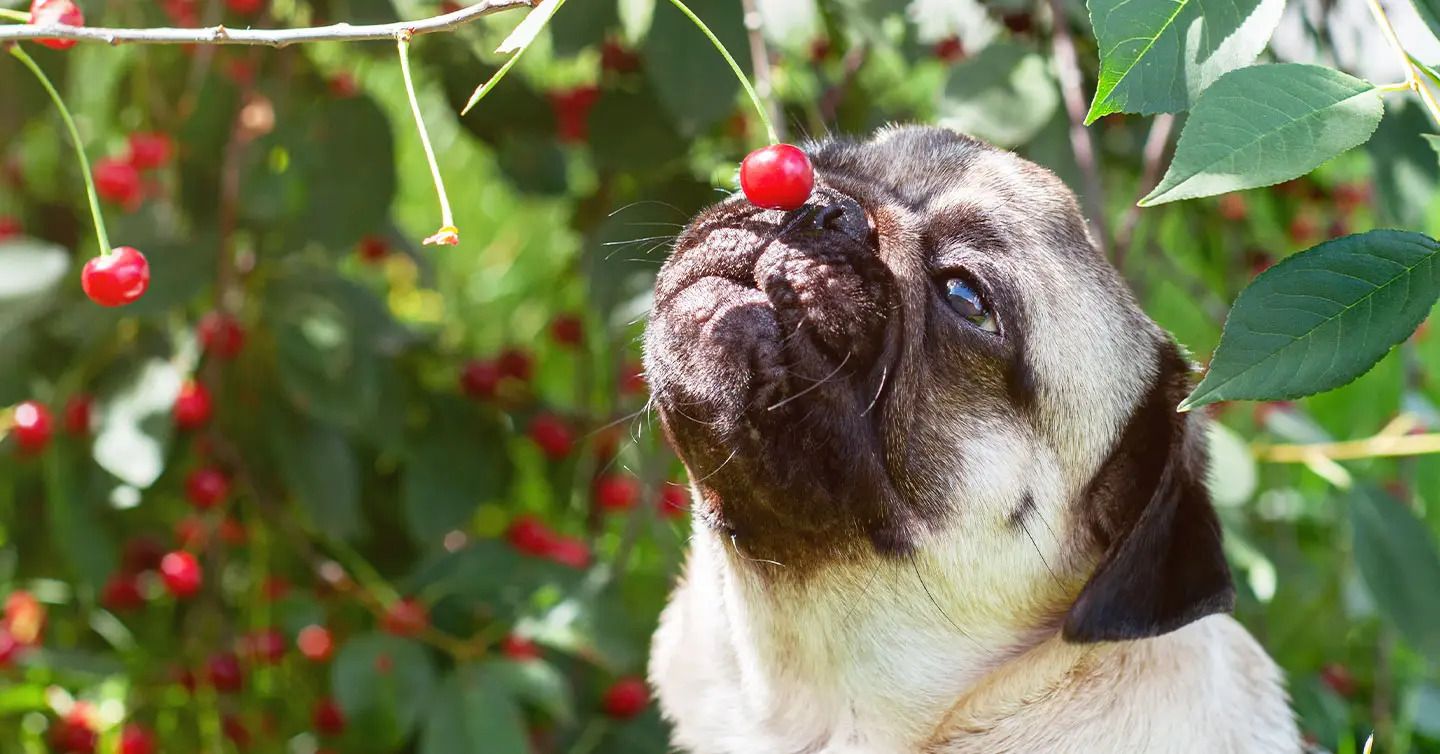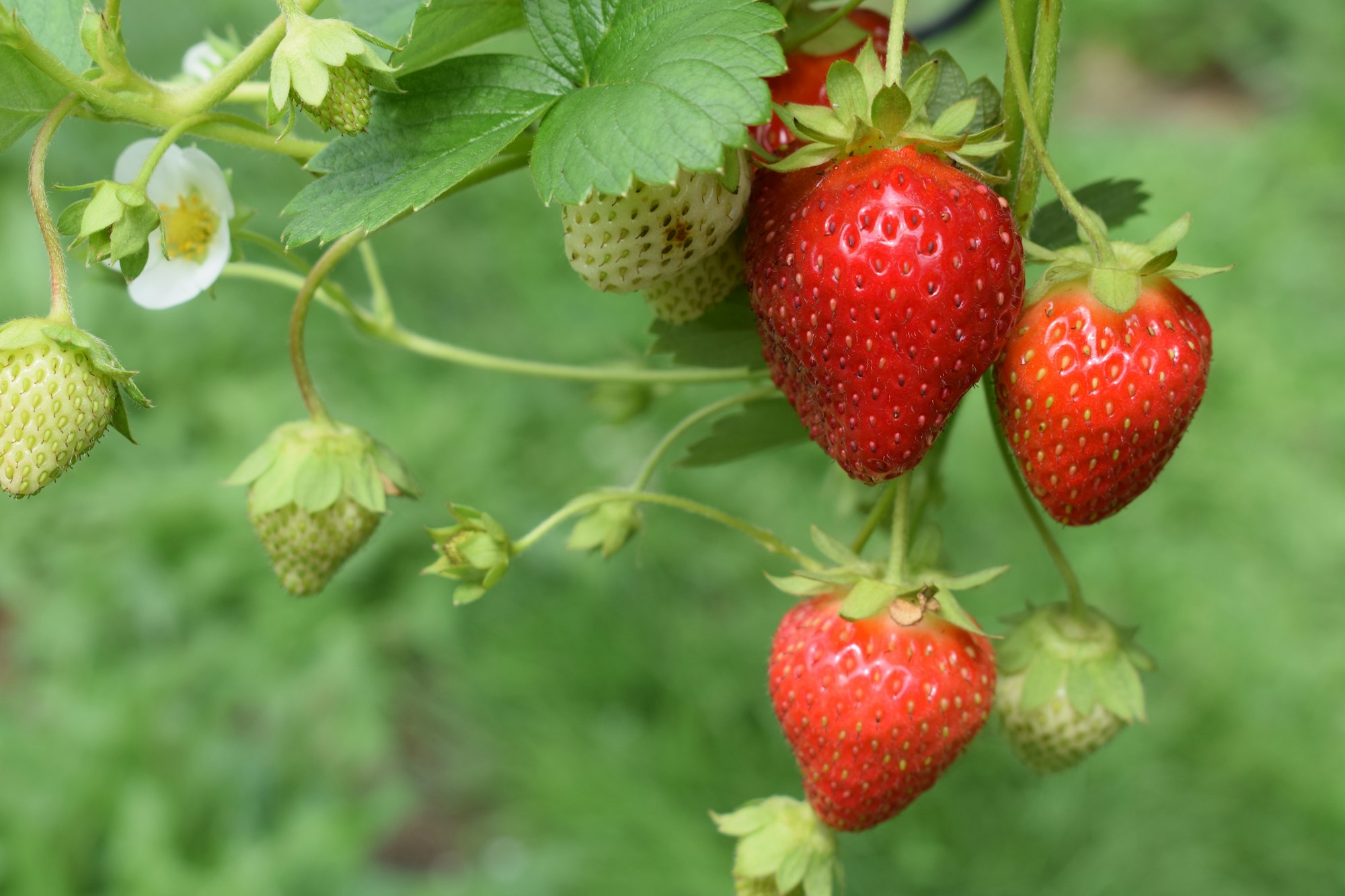When it comes to our furry friends, their health and well-being are of utmost importance. As a responsible happy dog owner, you might wonder if it's safe to share your favorite fruits with your canine companion. In this article, we will explore whether dogs can eat cherries and the potential benefits and risks associated with feeding them to your furry friend.

Are Cherries Safe for Dogs?
Cherries are a popular fruit enjoyed by many, but when it comes to sharing them with our canine companions, caution is advised. While cherries themselves are not toxic to dogs, certain parts of the cherry plant, such as the stems, leaves, and pits, can pose risks to their health. The pits, in particular, contain cyanide, which is highly toxic to both humans and dogs.
When dogs consume cherries, there is a potential choking hazard and a risk of intestinal blockages if they swallow the pits. The cyanide content in the pits can lead to symptoms such as difficulty breathing, dilated pupils, and even death in severe cases. It's crucial to be mindful of these risks and take appropriate measures to ensure your dog's safety.
Health Benefits of Cherries for Dogs
While there are potential risks associated with feeding cherries to dogs, they can also offer some health benefits when given in moderation. Cherries are a rich source of vitamins A and C, antioxidants, and fiber. These nutrients can support your dog's immune system, promote healthy digestion, and contribute to their overall well-being.
In addition to the vitamins and antioxidants, cherries also contain natural anti-inflammatory properties. This can be beneficial for older dogs or those suffering from arthritis or joint pain. The anti-inflammatory compounds found in cherries can help reduce inflammation and provide relief to good family dogs experiencing discomfort.
However, it's significant to note that the health benefits of cherries for dogs can be obtained through other safer fruits as well. If you decide to introduce cherries into your dog's diet, make sure to remove the pits, stems, and leaves before offering them the fleshy part of the fruit. Remember to start with small quantities and monitor your dog's reaction. If you have any concerns or questions, Easing fear at the vet for personalized advice.
It's essential to prioritize your dog's well-being and make informed decisions about their diet. While cherries can provide some benefits, it's crucial to balance them with the potential risks and consider alternative fruits that are safer for your furry friend.
Potential Risks of Feeding Cherries to Dogs
Feeding cherries to your dog without taking proper precautions can lead to potential health risks. It's essential to be aware of the following risks associated with cherries:
a) Choking Hazard: The pits of cherries are small and can pose a choking hazard for dogs, especially small breeds or those prone to gulping down their food. If a dog accidentally swallows a cherry pit, it can get lodged in their throat or obstruct their digestive system.
b) Intestinal Blockages: Swallowing cherry pits can also lead to intestinal blockages in dogs. These blockages can be dangerous and require immediate veterinary attention. Symptoms of an intestinal blockage may include vomiting, loss of appetite, abdominal pain, and changes in bowel movements.
c) Cyanide Poisoning: Cherry pits contain cyanide, which is toxic to both humans and dogs. When dogs chew or ingest cherry pits, the cyanide can be released and cause poisoning. Symptoms of cyanide poisoning in dogs may include difficulty breathing, dilated pupils, red gums, seizures, and even death in severe cases.
d) Upset Stomach and Diarrhea: Some dogs may have sensitive stomachs or be prone to digestive issues. Feeding cherries to such dogs can lead to an upset stomach, diarrhea, or gastrointestinal discomfort. It's demanded to monitor your dog's response to cherries and discontinue feeding them if any adverse effects occur.
How to Safely Feed Cherries to Your Dog

If you still wish to feed cherries to your dog, it's crucial to take the necessary precautions to ensure their safety. Here are some guidelines for safely feeding cherries to your canine companion:
a) Remove the Pits, Stems, and Leaves: Before offering cherries to your dog, ensure that you remove the pits, stems, and leaves. These parts of the cherry plant contain substances that can be harmful to dogs.
b) Offer Only the Fleshy Part: Dogs can safely consume the fleshy part of cherries. Cut the cherries into small, bite-sized pieces to prevent choking hazards and make them easier to chew and digest.
c) Start with Small Quantities: Introduce cherries to your dog's diet gradually and in small amounts. Watch for any signs of gastrointestinal upset or allergic reactions. If your dog tolerates cherries well, you can gradually increase the serving size.
d) Moderation is Key: Cherries should be considered an occasional treat and not a regular part of your dog's diet. Excessive consumption can lead to digestive issues and an imbalance in their overall diet.
e) Consult Your Veterinarian: If you have any concerns or questions about feeding cherries to your dog, it's always crucial how often vet. They can provide personalized advice based on your dog's specific health needs and dietary requirements.
By following these safety measures, you can minimize the potential risks associated with feeding cherries to your dog. However, it's critical to remember that cherries are not essential for your dog's diet, and there are alternative fruits that are safer and offer similar health benefits. Always prioritize your dog's well-being and make informed decisions about their dietary choices.
Alternative Fruits for Dogs
If you're looking for safe and healthy alternatives to cherries, several fruits are generally safe for dogs to consume. These fruits offer similar nutritional benefits and can be a tasty addition to your dog's diet. Here are some alternative fruits for dogs:
1. Apples: Apples are a great source of vitamins A and C, as well as dietary fiber. They can help support your dog's dental health by promoting fresh breath and clean teeth. Remember to remove the seeds and core before feeding apples to your dog, as the seeds contain small amounts of cyanide.
2. Blueberries: Blueberries are rich in antioxidants, which can help support your dog's immune system and overall health. They are also low in calories and high in fiber, making them a nutritious snack for your furry friend.
3. Watermelon: Watermelon is a hydrating fruit that dogs can enjoy, especially during the hot summer months. It's packed with vitamins A and C, as well as lycopene, which can have beneficial effects on heart health.
4. Bananas: Bananas are a great source of potassium, vitamin B6, and dietary fiber. They can provide a quick energy boost and aid in digestive health. However, bananas should be given in moderation due to their high sugar content.
5. Strawberries: Strawberries are a delicious treat that dogs can enjoy. They are packed with vitamins, fiber, and antioxidants. Just like with other fruits, remember to wash and remove the leaves before feeding strawberries to your dog.

When introducing new fruits to your dog, it's needed to start with small quantities and monitor their response. Some dogs may have individual sensitivities or allergies to certain fruits, so always observe for any signs of adverse reactions. Additionally, moderation is key when offering fruits to your dog. While they can provide nutritional benefits, fruits should not replace a balanced and complete dog food diet.
Consulting with your veterinarian is always recommended before making any significant changes to your dog's diet, including the addition of new fruits. They can provide personalized advice based on your dog's specific health needs and dietary requirements.
Remember, the safety and well-being of your dog should always be the top priority when selecting and introducing fruits into their diet.

Dogs and Cherries: Interesting Facts
When it comes to dogs and cherries, there are some interesting facts to consider. Here are a few intriguing points about dogs and their relationship with cherries:
1. Sense of Smell: Dogs have an incredibly keen sense of smell, and they can detect the scent of cherries from a distance. The aroma of cherries might pique their curiosity and make them interested in exploring these fruits.
2. Taste Preferences: Dogs have different taste preferences compared to humans. While cherries may be appealing to us, dogs may not find them as enjoyable due to their natural inclination towards meat-based flavors.
3. Toxicity Concerns: While cherries themselves are not toxic to dogs, certain parts of the cherry plant can be harmful to them. The stems, leaves, and pits of cherries contain substances that can pose risks to their health. It's necessary to be cautious and avoid letting dogs consume these parts.
4. Choking Hazard: The pits of cherries can be a choking hazard for dogs, especially if they swallow them whole. It's essential to remove the pits before offering cherries to your furry friend to prevent any accidents or obstructions.
5. Variety of Breeds: Dogs come in various breeds and sizes, and their ability to handle cherries may differ. Larger dogs might be able to tolerate cherries better than smaller breeds. It's crucial to consider your dog's size and any specific dietary restrictions or sensitivities they may have.
6. Health Benefits in Moderation: Cherries, when given in moderation and without the pits, can provide some health benefits to dogs. They are a source of vitamins, antioxidants, and fiber. However, it's crucial to balance these benefits with the potential risks and consult your veterinarian for personalized advice.
7. Alternative Fruit Options: If you're looking to provide your dog with fruits, there are safer alternatives to cherries. Fruits like apples, blueberries, watermelon, bananas, and strawberries are generally safe for dogs and offer similar nutritional benefits.
Remember, while it's tempting to share our favorite fruits with our furry friends, it's important to prioritize their well-being and make informed decisions about their diet. When introducing any new food, including cherries, to your dog, it's advisable to consult with your veterinarian to ensure their safety and to address any concerns you may have.

Frequently Asked Questions (FAQs)
Here are some frequently asked questions about feeding cherries and alternative fruits to dogs:
1. Can dogs eat cherry pits?
No, dogs should not eat cherry pits. Cherry pits can be toxic to dogs and also pose a choking hazard.
2. Are cherries toxic to dogs?
Cherries themselves are not toxic to dogs, but other parts of the cherry plant, such as the stems, leaves, and pits, can be harmful to them.
3. What are the risks of feeding cherries to dogs?
Feeding cherries to dogs can pose risks such as choking, intestinal blockages, and cyanide poisoning from the pits.
4. How many cherries can I feed my dog?
It's recommended to feed cherries to dogs in moderation. Start with small quantities and adjust based on your dog's size and tolerance.
5. Are there any alternative fruits that are safe for dogs?
Yes, several alternative fruits are generally safe for dogs, including apples, blueberries, watermelon, bananas, and strawberries.
6. Can dogs eat apples with the skin?
Yes, dogs can eat apples with the skin, but it's required to remove the seeds and core as they contain small amounts of cyanide.
7. Are blueberries safe for dogs?
Yes, blueberries are safe for dogs and can provide them with antioxidants and other beneficial nutrients.
8. Can watermelon be given to dogs?
Yes, dogs can enjoy watermelon in moderation. It's a hydrating fruit that can be a refreshing treat for them.
9. Are bananas safe for dogs?
Yes, bananas are safe for dogs and can provide them with potassium, vitamin B6, and dietary fiber.
10. Should I consult my veterinarian before feeding fruits to my dog?
It's always a good idea to consult your veterinarian before making any significant changes to your dog's diet, including the addition of new fruits. They can provide personalized advice based on your dog's specific needs.
Remember, every dog is unique, and it's typical to monitor their response to different fruits and make informed decisions about their dietary choices.




